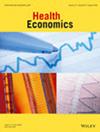疫苗接种和风险规避:来自流感疫苗接种运动的证据。
IF 2.4
3区 医学
Q2 ECONOMICS
引用次数: 0
摘要
我们研究了法国流感疫苗接种运动对疫苗接种行为的因果效应。65岁及以上的人会收到一封带有免费流感疫苗券的邀请函,而那些不符合条件的人必须自己支付费用。使用模糊回归不连续设计,我们发现收到带有优惠券的邀请函导致接种疫苗的可能性显着增加。这种效应是由规避风险的个人驱动的。正如我们的理论模型所示,对他们来说,流感感染的成本超过了疫苗副作用的成本。本文章由计算机程序翻译,如有差异,请以英文原文为准。
Vaccination and Risk Aversion: Evidence From a Flu Vaccination Campaign.
We examine the causal effect of a French flu vaccination campaign on vaccination behavior. Individuals aged 65 and over receive an invitation letter with a voucher for a free flu shot, while those who are not eligible have to cover the costs themselves. Using a Fuzzy Regression Discontinuity Design, we find that receiving the invitation letter with the voucher leads to a significant increase in the likelihood of getting vaccinated. This effect is driven by individuals who are risk-averse. As illustrated in our theoretical model, for them, the costs of influenza infection outweigh the costs of the vaccine's side effects.
求助全文
通过发布文献求助,成功后即可免费获取论文全文。
去求助
来源期刊

Health economics
医学-卫生保健
CiteScore
3.60
自引率
4.80%
发文量
177
审稿时长
4-8 weeks
期刊介绍:
This Journal publishes articles on all aspects of health economics: theoretical contributions, empirical studies and analyses of health policy from the economic perspective. Its scope includes the determinants of health and its definition and valuation, as well as the demand for and supply of health care; planning and market mechanisms; micro-economic evaluation of individual procedures and treatments; and evaluation of the performance of health care systems.
Contributions should typically be original and innovative. As a rule, the Journal does not include routine applications of cost-effectiveness analysis, discrete choice experiments and costing analyses.
Editorials are regular features, these should be concise and topical. Occasionally commissioned reviews are published and special issues bring together contributions on a single topic. Health Economics Letters facilitate rapid exchange of views on topical issues. Contributions related to problems in both developed and developing countries are welcome.
 求助内容:
求助内容: 应助结果提醒方式:
应助结果提醒方式:


